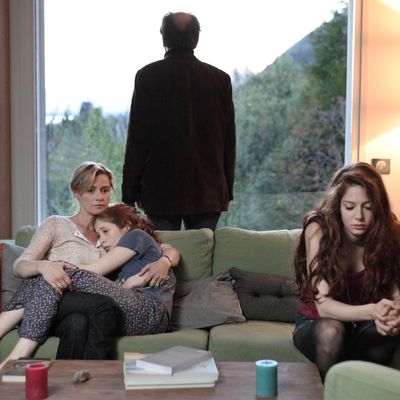
We’re up to our eyeballs in supernatural shows right now. Witches and vampires, zombies and mutants, mythological creatures and ghosts: They’re everywhere, and they’re mostly telling us freaky stories (see American Horror Story) or spooky stories (Ravenswood), or stories meant to frighten (The Walking Dead) or titillate us (The Vampire Diaries), or both (True Blood). At this point, though, it feels like those shows poke at the same point in our psyches. But the French import Les Revenants (a.k.a. The Returned), which premieres tonight on Sundance Channel at 9 p.m., takes a wholly different approach, one that doesn’t go for scary or sexy. Les Revenants is uncanny.
And not colloquially uncanny — in the Freudian sense of uncanny, a reversal of stable and impossible. The show is set in a small town in France where, one day, deceased residents start reappearing: a tween girl who was killed in a bus accident, a sexy biker who died just before his wedding, a little boy who refuses to speak but died more than 30 years ago. They look just as they did the day they died, and they don’t remember exactly what happened or where they’ve been in the meantime. (There are other ominous goings-on in the area, most notably a local reservoir rapidly drying up and the reappearance of a local serial killer.) The friends and families of these “returned” visitors are on the one hand overjoyed; who hasn’t, in a grief state, wished and prayed for their loved one to just walk right through the door like nothing happened? But people are also frightened, disturbed, and profoundly confused — because how could you not be? For Freud, uncanniness is unheimlich, or “unhomely” — the dissonant idea of “my home, but not my home,” which is the backbone of Les Revenants. It’s both joyous and terrifying, both a blessing and a curse, a familiar thing becoming totally unfamiliar and a crazy thing somehow feeling normal. Like in a dream.
And Les Revenants is very dreamy, both aesthetically (e.g., the music of Mogwai provides the score) and thematically. It’s real and surreal at once. I’m exactly the same, but everyone around me is different, think the undead. I’ve become different, but suddenly everything around me is how it was, years ago, think the survivors. Rare is the show that addresses the ordinary madness caused by grief, but Les Revenants acknowledges that magical thinking as a matter of course.
In Freud’s essay “The Uncanny,” he talks about wandering through Amsterdam at night and accidentally finding himself in the red light district. He tries to hurry away, only to accidentally (well, it’s Freud, so “accidentally”) wander right back. Uncanniness can be experienced as a series of unconscious “returns,” he says, a retracing of steps we didn’t realize we were taking. On Les Revenants, it’s not just the dead who return. The living, too, have to return to a mind-set, maybe to a physical home, to an identity they’d wandered away from. That’s perhaps the most strikingly beautiful — and hauntingly, achingly sad — part of the show. It’s hard enough to hold in your head the idea that someone you loved has died. Now try holding onto the idea that they’ve come home. Well, not home. Unheimlich. Unhome.

